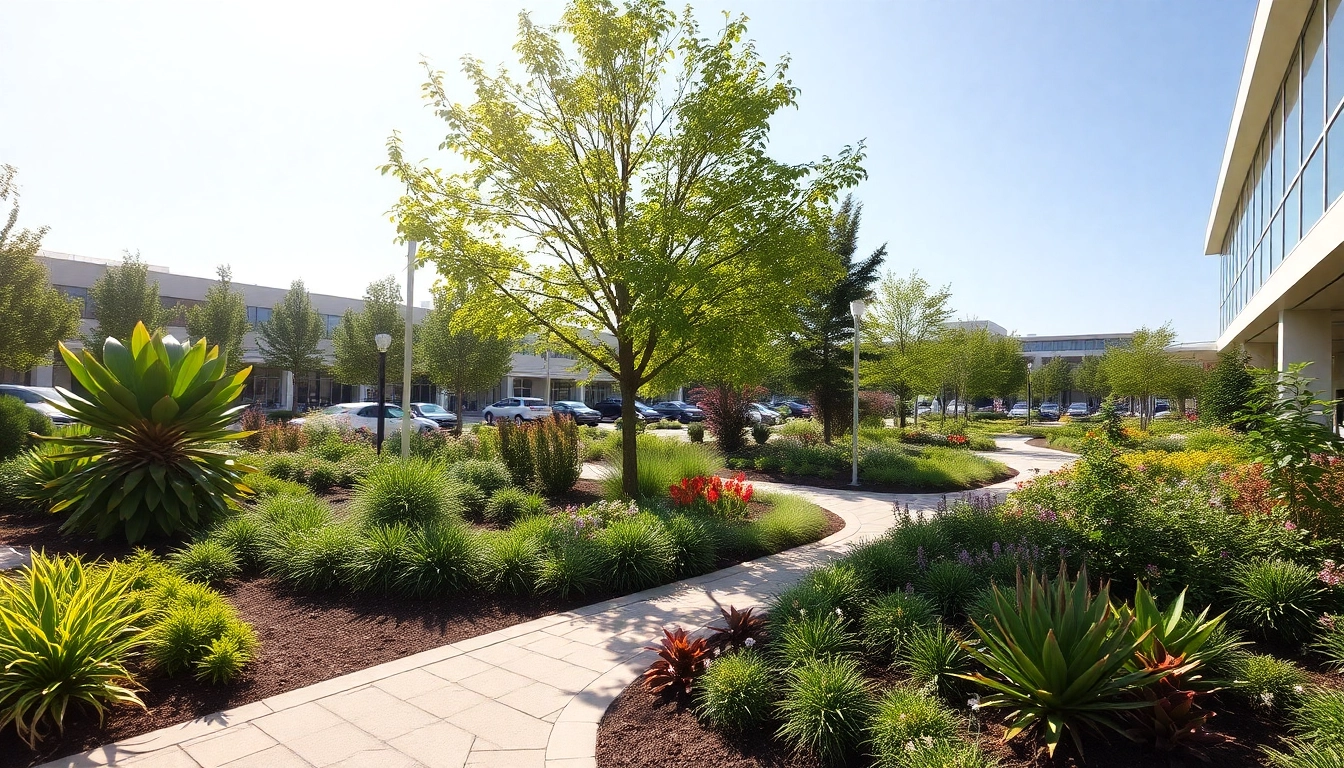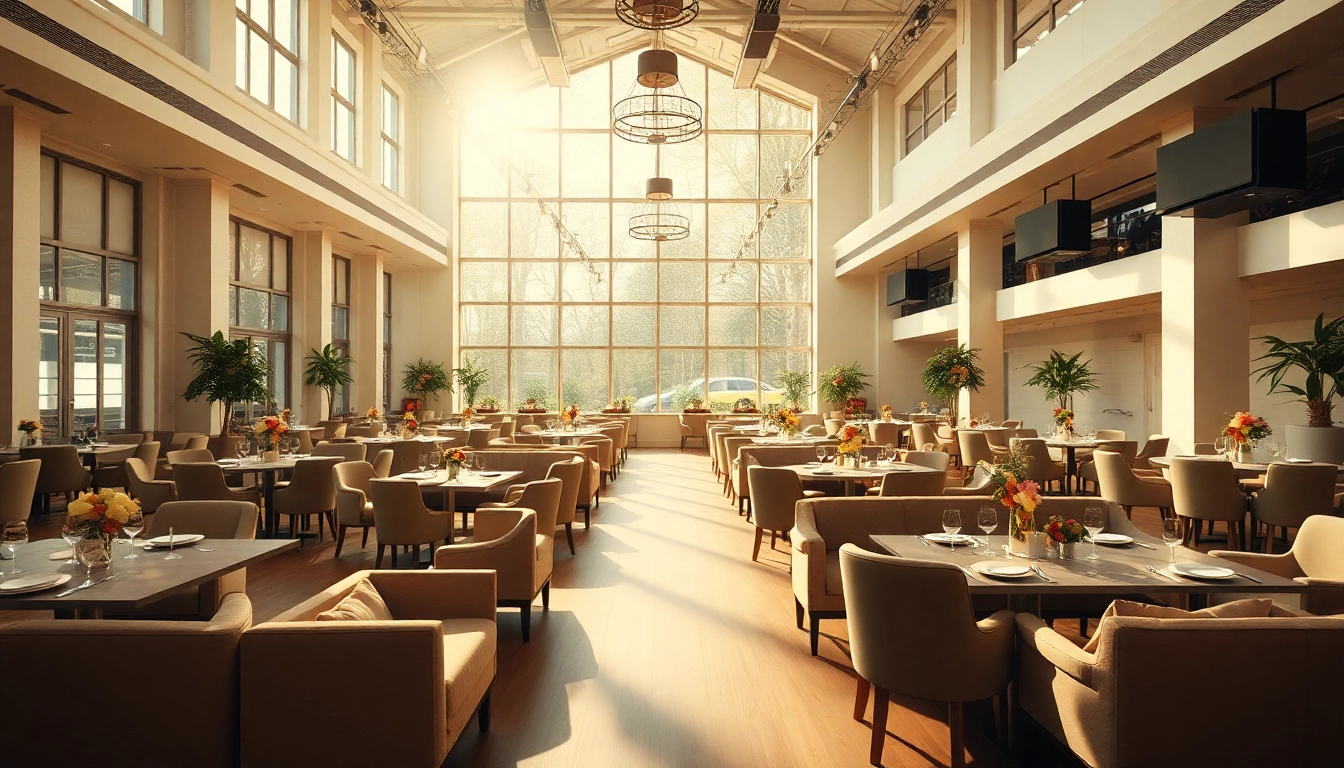Understanding Commercial Landscaping
What is Commercial Landscaping?
Commercial landscaping refers to the design, installation, and maintenance of landscaped outdoor spaces for various types of commercial properties, including office buildings, retail outlets, restaurants, schools, and public parks. This type of landscaping focuses on creating functional, aesthetic, and welcoming environments that enhance the overall appearance of commercial buildings while providing practical benefits like improved air quality and increased property value. In contrast to residential landscaping, commercial landscaping projects often involve larger scale infrastructure and require adherence to specific zoning laws and regulations. The role of commercial landscaping contractors is paramount in ensuring that these projects are executed professionally and meet the intended outcomes.
Key Differences Between Commercial and Residential Landscaping
While both commercial and residential landscaping share the common goal of enhancing outdoor spaces, several key differences set them apart:
- Scale and Scope: Commercial projects are typically larger and more complex than residential ones, requiring more materials, labor, and strategic planning.
- Design Considerations: Commercial landscaping must incorporate elements that appeal to a broader audience while reflecting the business’s brand and mission. In contrast, residential landscaping often focuses on personal taste and preferences.
- Regulations and Compliance: Commercial landscaping often requires permits and must comply with local regulations, including environmental guidelines, safety codes, and zoning laws.
- Maintenance Challenges: Due to higher foot traffic and usage in commercial spaces, the maintenance needs are typically more demanding and require specialized knowledge in plant care and turf management.
Benefits of Professional Landscaping for Businesses
Investing in professional commercial landscaping can yield numerous benefits for businesses:
- Enhanced Curb Appeal: A well-maintained landscape makes a strong first impression, drawing customers and clients into the business.
- Improved Employee Satisfaction: Green spaces positively impact employees’ morale and productivity, contributing to a healthier workplace environment.
- Increased Property Value: A well-designed landscape can significantly increase a property’s value, offering a good return on investment over time.
- Environmental Benefits: Professional landscaping contributes to improved air quality, reduced urban heat, and greater biodiversity.
Choosing the Right Commercial Landscaping Contractors
Factors to Consider When Hiring
Selecting the right commercial landscaping contractor is crucial for the success of your landscaping project. Here are some essential factors to consider:
- Experience and Expertise: Look for contractors with a proven track record in commercial landscaping. Their experience signifies an understanding of the unique challenges that may arise.
- Portfolio of Past Work: A reliable contractor should provide a portfolio showcasing their previous projects. This allows you to assess their design style and capability.
- Certifications and Insurance: Ensure that the contractor is licensed and insured to protect yourself from any liability during the project.
- Communication Skills: Good communication is vital for understanding your vision and expectations. The contractor should be willing to listen and adjust the plans based on your feedback.
Questions to Ask Potential Contractors
Before hiring a contractor, ask the following questions to gauge their suitability:
- What experience do you have with commercial properties similar to mine?
- Can you provide references from previous clients?
- What is your process for planning and executing landscaping projects?
- How do you handle unexpected challenges that may arise during the project?
- What kind of maintenance plans do you offer post-installation?
Reading Reviews and Testimonials
Researching potential contractors’ reviews and testimonials is one of the best ways to understand their reliability and quality of work. Look for feedback across multiple platforms, including online review websites and social media pages. Pay attention to how the contractor has handled criticism and resolved issues in the past, as this reflects their commitment to customer satisfaction.
Essential Services Offered by Commercial Landscaping Contractors
Landscape Design and Installation
Landscape design and installation is a core service offered by commercial landscaping contractors. This process involves:
- Consultation: Meeting with clients to understand their needs, preferences, and budget.
- Design Development: Crafting a design that incorporates various elements such as plants, hardscape features (e.g., pathways, patios), water features, and lighting.
- Installation: Implementing the design while ensuring minimal disruption to existing landscapes or structures.
A well-executed landscape design can transform commercial properties into inviting spaces that resonate with visitors and employees alike.
Maintenance Plans for Sustainable Growth
Ongoing maintenance is essential for keeping landscapes healthy, beautiful, and functional. Commercial landscaping contractors typically offer various maintenance plans, including:
- Irrigation Management: Regular checks and adjustments to irrigation systems to ensure optimal plant hydration without waste.
- Seasonal Plant Care: Pruning, fertilizing, and replacing seasonal plants to maintain aesthetic appeal year-round.
- Pest and Disease Management: Implementing eco-friendly pest control measures to protect plants without harming the environment.
Specialized Services: Irrigation and Hardscaping
In addition to the primary services, many commercial landscaping contractors offer specialized services:
- Irrigation Systems: Designing and installing efficient irrigation systems that conserve water while ensuring proper plant care.
- Hardscaping Solutions: Constructing durable hardscape features such as retaining walls, patios, and walkways to enhance landscapes and improve functionality.
- Landscape Lighting: Installing lighting solutions that not only illuminate pathways but also enhance the beauty of the landscape at night.
Cost Factors in Commercial Landscaping
Average Pricing Structures and What to Expect
The cost of commercial landscaping varies widely based on several factors, including:
- Project Scope: Larger or more complex projects will naturally cost more due to increased labor and material requirements.
- Location and Soil Conditions: Costs can vary depending on local market conditions and the quality of soil on site, which might require amendments or special treatment.
- Materials Used: The choice of plants, hardscape materials, and the quality of irrigation systems will influence the overall cost.
How to Estimate Your Landscaping Budget
To develop a realistic landscaping budget, consider the following steps:
- Assess the Scale: Determine the size of the area to be landscaped and outline your objectives and preferences.
- Gather Quotes: Reach out to multiple contractors to obtain detailed quotes that include labor, materials, and maintenance.
- Factor in Unexpected Costs: Always set aside a contingency budget (typically 10-15%) to cover any unforeseen expenses.
Understanding Cost-Effective Solutions
To maximize your landscaping budget, consider cost-effective solutions like:
- Choosing native plants that require less water and maintenance.
- Implementing xeriscaping principles to reduce water use.
- Investing in durable hardscape materials that require minimal upkeep over time.
Best Practices for Ongoing Landscape Maintenance
Seasonal Care Tips from Expert Landscaping Contractors
Maintaining a healthy landscape throughout the year requires attention to seasonal changes. Here are some best practices:
- Spring: Fertilize landscape beds and check irrigation systems; prepare for planting new season crops.
- Summer: Monitor for pests and diseases; ensure proper watering during hot months.
- Fall: Perform a thorough clean-up, including raking leaves, and prepare plants for winter.
- Winter: Assess damage from cold temperatures and plan for spring renovations and plantings.
Monitoring Growth and Managing Issues
Regularly assess the health of plants and the effectiveness of irrigation systems. If issues arise, such as pest infestations or plant disease, contact your contractor for expert solutions.
When to Consult With Professionals
While some maintenance tasks can be performed in-house, consulting with professionals is advisable when:
- Major landscape modifications are needed.
- Unique pest or disease issues arise that require specialized treatment.
- You are unsure about the best plants or materials for the project.



